Last ditch stand: one family’s traumatic escape from Kabul
A young Afghan family fleeing the Taliban is guided out of Kabul by strangers in Sydney using maps and messages – and help from the highest echelons in Canberra.
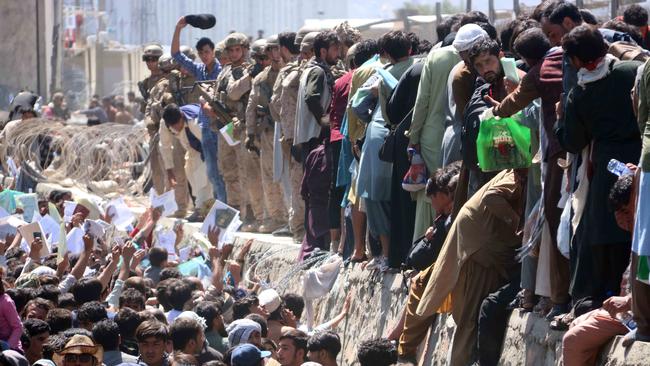
A man is standing on the edge of a ditch, although in the confusion enveloping Kabul even that is open to conjecture. Some, who will be forced to wade through its squalid waters, call it a canal. More than anything on this searing, desperate weekday, however, it seems like an open sewer.
Ever since the Taliban surprised the outside world and powered into Afghanistan’s capital a few days ago, thousands of fleeing residents have been massing in this filthy cavity on the edge of Hamid Karzai International Airport. Knee-deep for hours in water laced with human excrement, they holler and wave passports and home-made signs to the armed troops hovering above the ditch. If they are lucky, some of these foreign forces, whose control of the city has been reduced to this airfield, will haul them up to street level. If their miracle continues, they might be processed inside the terminal and flown to a foreign haven.
Success, however, is elusive. People are trampled, some collapse during the long hours waiting in the heat or are killed by stray bullets, and there are warnings of suicide bombings around the airport. Yet for those in this fetid waterway on this late August day, the most pressing issue is visibility. When so many others are clamouring for mercy, how do you ensure that a saviour soldier picks you?
Ehmad* has been facing this dilemma for hours. A communications officer for an international humanitarian agency for more than 13 years, he is more accustomed to helping people in emergencies than being a reluctant participant. But the Taliban’s return to Kabul has ended that. His wife Leyla* is a former national Shotokan karate competitor who used to run her own women’s gym. Now her life is under threat because sportswomen are the embodiment of so much that the Taliban opposes.
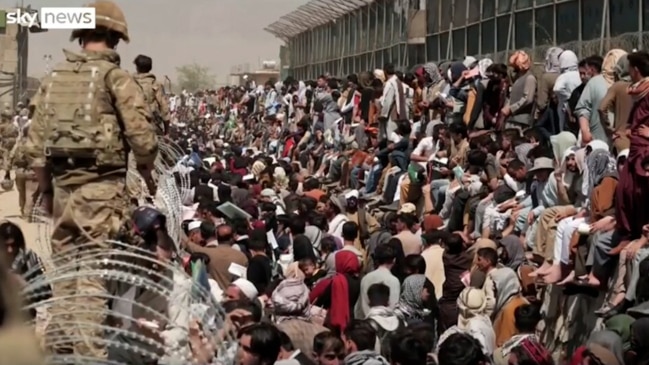
Having failed to convince his employer to help them escape, Ehmad, 33, has spent days trying to shepherd his wife, their three young children and his 21-year-old nephew to a safer future. He has been beaten and pepper-sprayed, his spectacles smashed. Over five nights he has slept just 10 hours. On one of those nights, with his family seated inside, three bullets have been fired into their rented minibus. And still they haven’t breached the airport, although Ehmad is now on its perimeter, sitting on the opposite wall of the ditch not two metres from the soldiers but indistinguishable within the crowd. He is at a point of no return. You have to go now, says the message on his phone from the woman to whom he has entrusted his family’s fate. This is the last chance. You must make it work. You cannot go home. People will look for you… This is it.
Over the past few terrifying days, something extraordinary has happened to this family. Through Leyla’s sporting affiliations, a group of lawyers and human rights activists, many of them former elite athletes living far from Afghanistan, has been remotely navigating the family’s escape from the city, potentially to Australia. At this moment, one of these unseen saviours is sitting in her sparse spare bedroom in suburban Sydney and, via WhatsApp, is urging Ehmad off the fence.
You must get in the water, types Alison Battisson, a former boxer turned human rights lawyer who has been in almost constant contact with the family for days. In reply, Ehmad sends her a pin drop and photos of his latest location on the wall of the ditch. Please just take your family into the water, Battisson replies minutes later. Dig in and take them in. They will cry. It is OK. They will be taken in soon. Mild-mannered and compliant throughout these long days of exchanges, Ehmad is suddenly hesitant. He needs to be in the water so that, through the connections of outsiders like Battisson, foreign forces might spot the family below and be directed to retrieve them; at the moment he is too far away. But he is also terrified of stepping down into the ditch.
That is the only way to do this, Battisson messages again from the other side of the world. At least you. Kids on wall maybe? Still Ehmad hesitates. Only days ago, his two-year-old daughter Sahar was crushed when a crowd was forced to scatter and a mini-stampede ensued. The thought of this happening in this rancid stretch of water, when none of his family can swim, is unbearable.
Ehmad attempts a compromise. While he waits near his wife and children, his nephew Mehmood*, also imperilled because of his social media presence, wades into the sewer and frantically waves the “A.U.S.” sign he has been instructed to carry. But even this is not enough.
When Ehmad next looks at his phone, he has a new message from the Australian lawyer. They have shared hundreds of exchanges in recent days, mostly instructive, many filled with emotion. Not this one: Get. In. The. Water. Now.
His old future has disappeared. His new future will be shaped by what happens next. The faceless people cajoling him remotely have never been to this place, let alone endured his family’s trauma. How can he trust them?
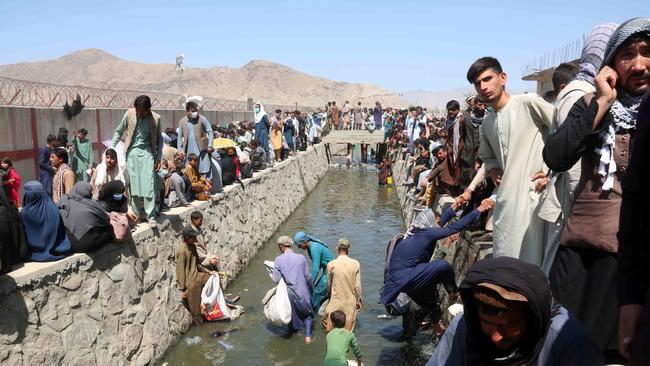
Although he has spent his life in Afghanistan, living and working in one of the world’s most dangerous places, Ehmad will remember August 2021 as the worst of times. He will remember his wife’s despair in the days the Taliban neared the capital, fearful that the recriminations that had begun 15 years earlier – when she had been attacked for competing overseas without a headscarf and was forced to close her women’s dojo after less than a year – would be even worse now. “They will come and kill me,” she would cry. “They will come and take my son as they took my brother hostage.”
He will remember being at his office on August 15 when the Taliban entered Kabul; Leyla calling him 20 times; how he pleaded with his employer to help his wife and children, who as persecuted Hazaras had endured years of discrimination. He explained the urgency to flee the Taliban: “Because she wouldn’t survive.” But they said, “No, we can’t do that.” He adds bitterly of his employer’s refusal to help: “They will give you thousands of excuses.”
He will remember the utter despair of the following days, his six-year-old daughter Sana crying constantly, the shuttered shops and food shortages, and how he feared his wife would run out of the antidepressants that had helped her through years of persecution. He will also remember the tsunami of goodwill that found its way into his family’s newly bought home when some acquaintances from a conference in Indonesia set up a WhatsApp group to check on his welfare. One delegate, an Australian, asked how she could help. Soon after, Ehmad received his first message from a lawyer in Sydney.
A forthright and gregarious woman, Battisson has spent years helping asylum seekers. For her, August 2021 stands out for many reasons: the all-consuming days; the precious snatches of sleep while the rest of Sydney was focused on lockdown; the weight of being relied on by so many people asking for help to flee, and the longest and most dramatic extraction of an unassuming group of six who would become known as the Karate Family.
“I felt an affinity with them,” says Battisson. “They were this lovely family and they kept trying and trying and trying. And the dad would say, ‘It doesn’t matter whatever happens to us here, it’s better than what will happen under the Taliban’.
“The father on occasion would send me a voice message: ‘We’ve just been crushed. We’ve just been attacked.’ Breathless, frightened, putting his family at risk for potentially being saved – after some random person in Australia says: ‘We’ve done a visa application for you. You’ve got to get yourself into the airport.’ I can’t believe this family kept trusting us.”
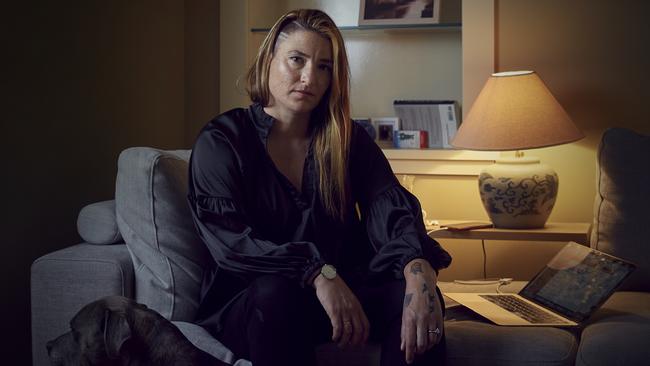
When Battisson first messaged Ehmad in Kabulon Friday night, August 20, he had no thoughts of Australia as a possible refuge; his knowledge of the country was limited to the national cricket team. But Battisson’s offer to help was hardly impromptu. Having assisted several Afghan athletes seeking asylum during the 2018 Invictus Games in Sydney, over the previous week she had been working with a senior Australian bureaucrat to expedite visa applications for many of their fleeing families.
With her caseload rapidly expanding, she connected with a handful of former athletes and lawyers in six countries who were also on the case. In Australia they included Canadian Olympic swimmer turned Sydney-based human rights lawyer Nikki Dryden, and retired soccer player Craig Foster, whose work to secure the release of Bahraini-born footballer Hakeem al-Araibi from a Thai jail three years earlier helped the group assemble a political strategy. Also working with them was lawyer and Olympian Zali Steggall who, as a federal MP, had been able to expedite the visa application process and issue letters for families confirming that visa applications had been made – a vital move as the situation in Kabul was rapidly degenerating.
By Friday August 20, thousands of troops were in their final week of securing Kabul’s airport before the US and its partners withdrew from the country. “The intel on the ground was if you could prove you had a visa application in, at that point they would let you into the airport,” Battisson recalls. She had just been advised that the Australian Government wanted those with proof of a valid visa application to immediately head for the airport, which could be accessed by a series of guarded gates. They would be processed inside.
Battisson offered to try to include Leyla’s name on a list of female athletes who needed to be whisked away. She would also begin the paperwork for the family to apply for a visa to Australia. “She didn’t promise that ‘100 per cent we can do this for you’. But she said, ‘This is a process of evacuation. We are trying,’” recalls Ehmad, who was keen to follow Battisson’s advice and head to the airport. “I completely trusted her.”
Leyla, though, was deeply sceptical. “She was saying, ‘This is just to convince me to be stronger… But it’s not reality. How is it possible in one or two days to get a visa and go to Australia?’” Ehmad’s brother, who lived elsewhere in Afghanistan, concurred. “He said, ‘You’re trusting everyone. Don’t risk your life. How do you know that these people can be trusted?’ I said, ‘I don’t have any alternative.’”
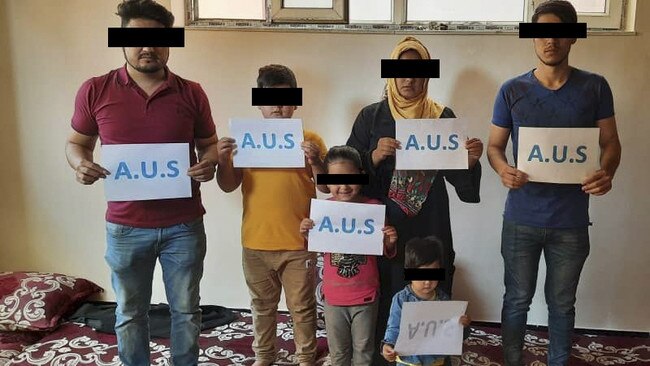
Gathering their daughters Sana and Sahar, andtheir son Ehsan, 10, Ehmad and Leyla grab medicines and passports, their marriage certificate, nappies and a few clothes for the children, and stuff them into backpacks. Leyla dons several layers of clothes. Ehmad’s simple outfit includes the only pair of jeans he will wear for the next six weeks. Around their necks they each carry a scarf that Battisson suggests they use to attract attention once they pass the Taliban.
Weeping, they leave home by car at 2am on Saturday, mindful of their new lawyer’s instructions: at one of the northern gates they need to attract the attention of a western military official, saying: “We are on the Australian list. There are officials waiting for us.” From a feisty Australian accustomed to courtroom battles, there is a tacit assumption that brashness is necessary. But for a terrified minority family who have spent a lifetime trying to blend in, this will not come naturally.
With thousands of others, they patiently wait outside the airport in the middle of the night. So many are desperate to pass through the gate there is no space to sit, let alone lie down. With three young children, and carrying Sahar in their arms, it is difficult to push forward; after 14 hours, the gate is shut and they are forced to leave. “They closed the door and started shooting,” says Ehmad.
“Because they had a two-year-old, they couldn’t push forward in the crowds, and they were more passive, almost like there was a line that was going to gradually move forward,” says Battisson of the family’s response to the mayhem that encircled them. In more than half a day, they progress perhaps five metres. Ehmad messages Battisson, they are going home. “It’s a risk they will target us there, but here we will be killed by these soldiers or this huge rush of people.” In the crush to leave, Sahar falls from her mother’s arms, injures her leg and is briefly unconscious; in the madness they briefly lose her sister Sana.
That night they leave home for the second time, this time carrying a letter confirming that an application for a humanitarian visa has been lodged for them by MP Zali Steggall, who has been frantically pushing through dozens of similar applications in Sydney. Steggall’s pleas for assistance have been heard by Foreign Minister Marise Payne, who is keen to assist. With Craig Foster also in regular contact with Immigration Minister Alex Hawke, the visa application process is rapidly streamlined as the ministers commit to getting at-risk athletes onto evacuation flights. “I would normally be fairly critical of the Federal Government’s refugee policy. But in the crisis situation of those days, where we had limited opportunity, I had nothing but praise,” says Steggall. “In this job you advocate for a lot of things. But it’s not often that you get a real tangible opportunity to change someone’s life.” Steggall works with a small group of staff throughout the weekend and for days after. They create a spreadsheet to track the dozens of evacuees they are assisting, including members of the national women’s soccer team. While some groups start entering the airport through the Abbey gate, the Karate Family’s status keeps being updated for the wrong reasons: “stuck in their car”; “young child is sick”; “exhausted, cannot go on”.
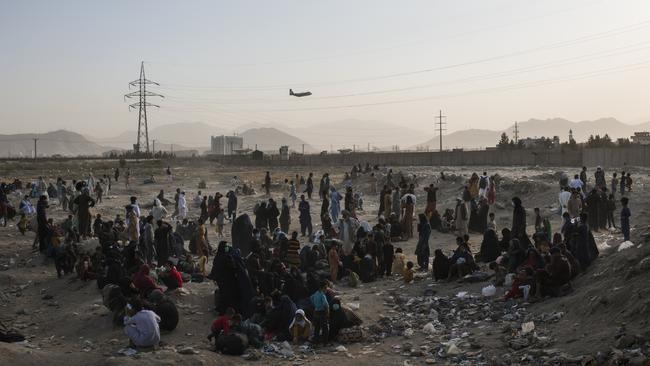
In a crucial move, the origins of which are still unclear, an Australian corporal contacts Ehmad, who gives the military officer Battisson’s number. The corporal, who claims to be in Kabul, is keen to help the family escape but Battisson is suspicious. “There was concern that the Taliban were infiltrating communications and I certainly didn’t want to have people delivered to the Taliban,” she says of her initial doubts that the man communicating with Ehmad is even Australian. Eventually she rings the corporal to verify his credentials, and then begins working closely with him. (The Department of Defence did not respond to a request for an interview with the corporal.)
Using multiple maps showing Taliban checkpoints, the gates to the airport and the countries operating them, Battisson can pinpoint the family’s location within 10m. Photographs showing the clothes they are wearing make them easier to spot, although they also put the family at risk of death should the Taliban disapprove of the images. On Saturday night the family heads to another gate where, as a result of the news spreading about the US and other countries helping Afghans to flee, a crowd even bigger than that of the previous evening has massed. Please Ali, Ehmad messages Battisson, do something for the sake of God, otherwise at the Abbey gate my kids can be killed.
To minimise the risk to his family, Ehmad takes his wife and children back to the car and returns to the gate without them. In the early hours of Sunday, after he has been waiting near the airport for six and a half hours, Leyla messages him: three bullets have struck their car, narrowly missing her.
On the phone in Sydney, Battison is horrified. But she is also mindful that the family’s priority is to escape. “They’re a family at extreme risk and the airport appears the only way to get out. I told them, ‘It’s very unfortunate you were shot up but if you can try again, you should.’ I know that sounds callous. Yes, they were very upset. But they weren’t dead; there was still something to fight for.”
The family retreats again to the home they thought they had abandoned forever. Again they are encouraged from Australia to have another go. Some women footballers have found a way into the airport via a sullied canal along its perimeter and so, later on Sunday, the family try to leave for a third time – but just 200m from the airport, they are stranded. They are directly shooting at anyone who wants to go one metre closer, Ehmad messages Battisson, who suggests the family move to the south gate near the Baron Hotel. But they end up at another gate, where the crowd is the biggest yet – perhaps 20,000 desperate people.
After again retreating for several hours, they return that night and line up for 13 hours to pass through a Taliban checkpoint. As they wait, Battisson messages with positive news: Australia will take you if we can get you in! And then, on Monday morning, just as they are almost ready to pass through the checkpoint, the Taliban have a change of shift. The replacements start whipping and cattle-prodding those in line, firing guns into the crowd and killing a woman and child. As the family turn back for a final time, Ehmad messages Battisson; Sorry dear Ali. We couldn’t make it.
“We decided they shouldgohome and rest,” says Battisson. “It was as relevant being 500m from the airport as it was being back at home; they weren’t close to being at the Abbey gate.”
The family is exhausted and deflated and so are those trying to find them a way out. “We got the call from them and it was, ‘The Taliban have broken up the line. We were the second family [in line waiting to get through]. They broke up the line. They beat us with sticks. My glasses are broken.’ And I just lost it. I just burst into tears,” says Nikki Dryden, who is tag-teaming with Battisson. “That moment was pretty devastating… We’d thought, ‘these guys are going to get in, we’re going to be done, mission accomplished’. We were so happy. When [the line was dispersed], even Ali, who is the toughest woman I know, had tears in her eyes.”
The corporal, however, has another plan. Late that night, the family are told to travel to a Kabul wedding centre where they are to join minibuses taking US translators to the airport. Ehmad is sent details of their vehicle and a confidential code that will serve as the boarding pass. But early next morning Ehmad sends the corporal a shattering message: Buses were almost empty but our code didn’t match. He recalls: “They said, ‘You’re on the wrong minibus. Your minibus has already left.’ We were very disappointed. That was our last chance.”
It is hard to imagine any more options. Having been sent home repeatedly, the family is devastated – and with three young children in tow, their possibilities for escape are even more limited. But they have not factored in the tenacity of the antipodean team. After some sleep, a reinvigorated Battisson messages Ehmad. According to the corporal, there is one more option. If they can access the canal on the airport’s perimeter, which is below ground level and therefore less likely to be the scene of a stampede, it will take them to the Abbey gate where, hopefully, they can be hauled up by western troops.
Before leaving home for a final time, Ehmad assembles his family for a photograph that will be used to help spot them in the crowd. In the image, each of them holds aloft an “A.U.S” sign. Leyla looks exhausted, her eyes lifeless. Oblivious to the occasion, six-year-old Sana smiles sweetly.
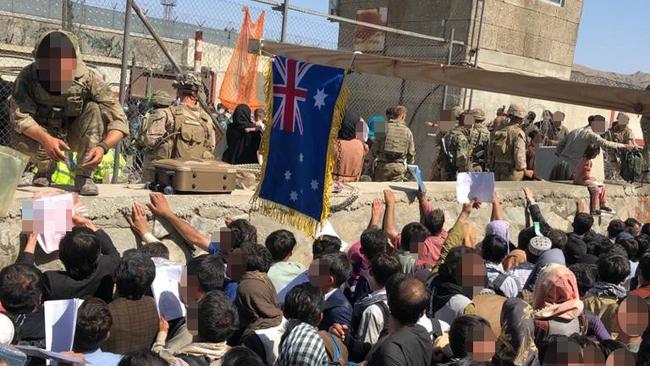
Throughout Wednesday, Ehmad receives a barrage of messages from the corporal and Battisson: Don’t be passive. This is the last chance. Push forward. You must be aggressive… Fight. As they park near the airport again and walk for the last few minutes, armed Taliban soldiers approach. They take offence at Ehmad’s light-sensitive glasses, which have turned darker in the afternoon sun. Deriding them as prohibited “stylish sunglasses”, they grab them, stomp on them and give Ehmad a beating. In the mayhem he loses track of Leyla and the two girls and they are separated for almost three hours. “It was terrible,” he says. “You can’t even imagine. You lose your wife and daughters in a situation where tens of thousands of people are rushing to the airport.”
Past the Taliban checkpoint, they spot western military and this time Ehmad heeds Battisson’s message not to be passive. At an observation point above the sewer, he starts waving and yelling. In response, he is pepper-sprayed by US forces. You can do this!!!, Battisson urges him from Australia after he washes out his eyes. Finally they enter the ditch and stand in the water with their scarves and their signs and their last vestiges of hope.
We are standing here, Ehmad messages the corporal. Please send someone.
I am trying mate, he replies.
Hours pass. Very hot weather kids are suffering.
I know mate. Please hang in there. I am in the process of trying to get you out. Stay there.
After more than four hours in the water, life slows. Please sir. My daughter is very little.
With his phone battery dwindling, Ehmad speaks to Battisson, who urges him to stay in the canal as help is imminent, and for the only time during his family’s traumatic ordeal does he show anger towards those in whom he has placed so much trust. “When you see your kids are dying, it’s very difficult to be calm,” he says.
After four hours in the water, Ehmad sends the Australians a devastating photo. In the heat and this endless wait, Sahar has become listless, possibly unconscious. She hasn’t taken anything since 11am. It is now 2.44pm. Battisson replies almost immediately: The foreign minister has been called.
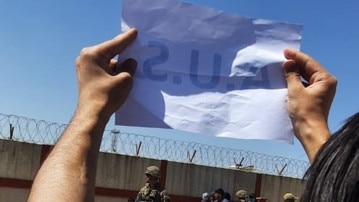
Threatening a foreign minister about leaving atwo-year-old in a ditch is an unorthodox tactic, but things then change rapidly. Battisson’s team messages a female general near the airport about the growing medical emergency developing in the sewer. The corporal and Craig Foster rally politicians. Armed with their location coordinates and their photograph, within minutes two Australian soldiers pluck the group out of the canal, but while trying to pass Sana to the soldiers her father trips and the six-year-old hits her head on the wall.
Forty-five minutes later, on the afternoon of August 25, the Karate Family is finally inside Kabul airport and heading for the gymnasium that has become the Australian camp. We are in. Thank you so much, Ehmad messages Battisson, and throws in a line of emojis: tears of happiness.
They are checked and cleared at a medical clinic and, armed with Steggall’s letter confirming an application has been lodged for an offshore visa on their behalf, the family line up to have their names ticked off and to have their hands stamped ready for travel. “They got inside and I was like, ‘I can go to bed. I can cry hysterically’,” recalls Battisson. “I called Craig [Foster]; we both burst into ugly sobbing tears.” Adds Foster: “I felt a responsibility to get them to safety, and the stress had just become overwhelming.”
The Karate Family are taken to a small processing centre in the airport but, unbeknown to their civilian Australian helpers, the rules have changed. They now need a visa to be allowed on a flight, not just proof of an application. They’re sending us back home, a frantic Ehmad messages Battisson half an hour later. They say there is no visa in the system. The family are escorted to the US sector of the airport where, with no visa, they will soon be ordered home. “I showed [the Australian official] everything,” Ehmad recounts of perhaps the lowest point of their journey. “I said, ‘This is the letter.’ He said, ‘I don’t care. This is a letter from a lawyer and this is a letter from a member of parliament and I don’t care because we don’t have you in the system.’ ”
It is after 10pm on the east coast of Australia. Foster urgently contacts immigration minister Hawke. Battisson reassures Ehmad that foreign minister Payne is working on a visa for his family. Through an informal group of volunteers, none of whom they have ever met, the Karate Family’s fate has filtered up to the highest echelons of Australian power. Staff from two government departments have made themselves available around the clock. But in the US section of the Hamid Karzai International Airport in Kabul, it feels like a death spiral. “I was thinking,” Ehmad recalls, “for four nights and five days you played with the life of your kids. You put your lives at risk and you arrived here. And now they are sending you back.”
For the longest three hours they languish in the US sector of the airport. Battisson suggests procrastinating, so they remove themselves from the line and sit down to eat. Everything is running out: time, the western forces’ hold on the airport, the power pack running the family’s third and last remaining phone – and flights to Australia. For Ehmad, it seems the cruellest and most anxious time, “three hours without any destiny, without any information about what would happen next”.
In her spare room in Sydney, Battisson is fuming to those higher up the chain: “These people have a baby, they’re disadvantaged. I will lose my shit [if they are not allowed in]. I will make it clear to everyone that private citizens did the work of government. So you will give me this family.” And then the corporal contacts her. “Ali, I will go and get them myself. Calls have been made. This family will get to Australia.’”
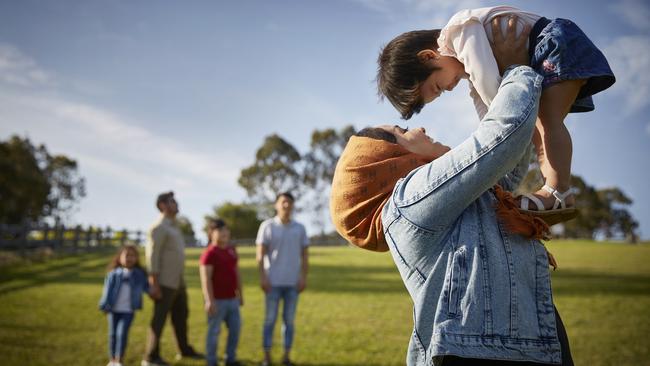
It is late on August 25 when Battisson again messagesEhmad. You are safe and you will be coming to Australia. I will chase paperwork tomorrow. You know that we had a general trying to wake the Prime Minister about your case?! Australians f..king love sport.
Inside the airport the atmosphere is buzzing. Everyone is exhausted but few are sleeping. “Outside that fence everyone was dying, everyone was suffering,” says Ehmad. “But inside that fence everyone was happy and safe.” Leyla’s mood has shifted remarkably. “She started to get more courage when she saw how many people with children had also gone through similar experiences.” And then comes what Ehmad considers the greatest moment of their journey. In a strange hall inside the country they are about to escape, he looks at his wife Leyla and spies a hint of their new future. “After almost nine days,” he says, “I saw the smile on her face.”
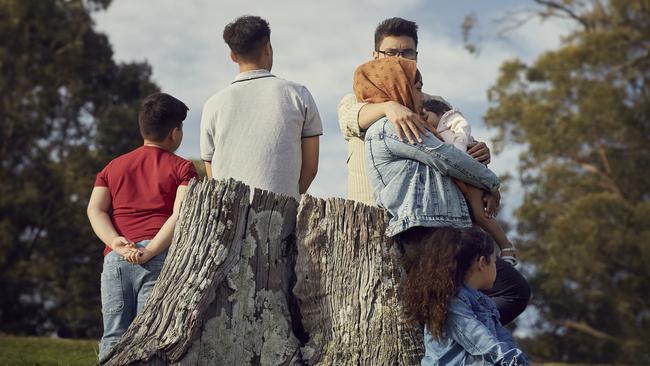
Ehmad is standing on the edge of a park. A warm breeze rushes through a stand of gum trees and apart from the distant thrum of traffic, the most noticeable sound is the distinctive warbling of magpies. This is his new neighbourhood, a suburban patch of Sydney – his family’s first Australian home. After a fortnight in Dubai they landed on September 7, tired, grateful, and still marvelling at their changing circumstances.
Less than 24 hours after they were plucked from the canal, suicide bombings killed dozens of people around the airport. Having helped about 4100 people to escape, Australia suspended its evacuation program. Over five days, using GPS coordinates and photos sent to him by Battisson and her team, and based on his own on-the-ground assessments, the corporal led dozens of people to safety. All up, Battisson’s network helped about 110 people to flee the country. The Karate Family was on one of the last Australian flights out of Kabul. Soon after, the corporal told Battisson his tour of Afghanistan was about to end – and so did their contact.
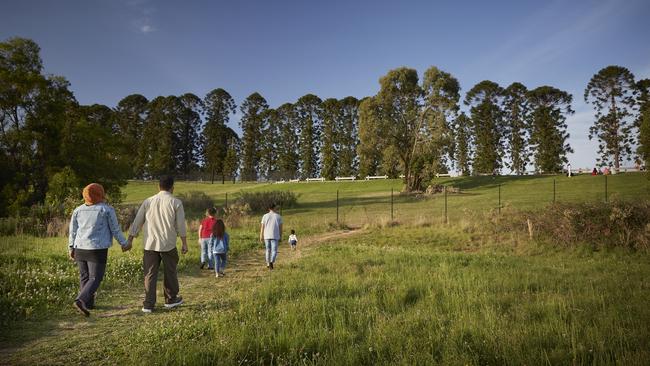
Even though the Karate Family’s escape was fraught, so much more might have gone wrong. Their rescue relied on the goodness of strangers, and also on technology. Had the internet failed or been cut off – WhatsApp endured a worldwide outage only weeks after their departure – they may have been trapped. “We were blind. We were in our own country but someone else was guiding us,” Ehmad says now as he looks around this new place that is still far from familiar. “I didn’t know them. But how they helped me; they weren’t even sleeping… They proved that humanity still exists.”
His gratitude is immense, but he is still finding it hard to look ahead and is so anxious for relatives left behind that he’s asked not to be fully identified. “It’s challenging: new environment, new country, new culture, new language. But we’re safe.” After months in temporary accommodation, the family has just moved into a house, the children will soon begin school, Mehmood is hoping to learn a trade at TAFE, and Leyla, who is keen to learn English, is hoping to work again as a karate teacher. Two of her first students are likely to be her daughters.
* Some names have been changed

To join the conversation, please log in. Don't have an account? Register
Join the conversation, you are commenting as Logout